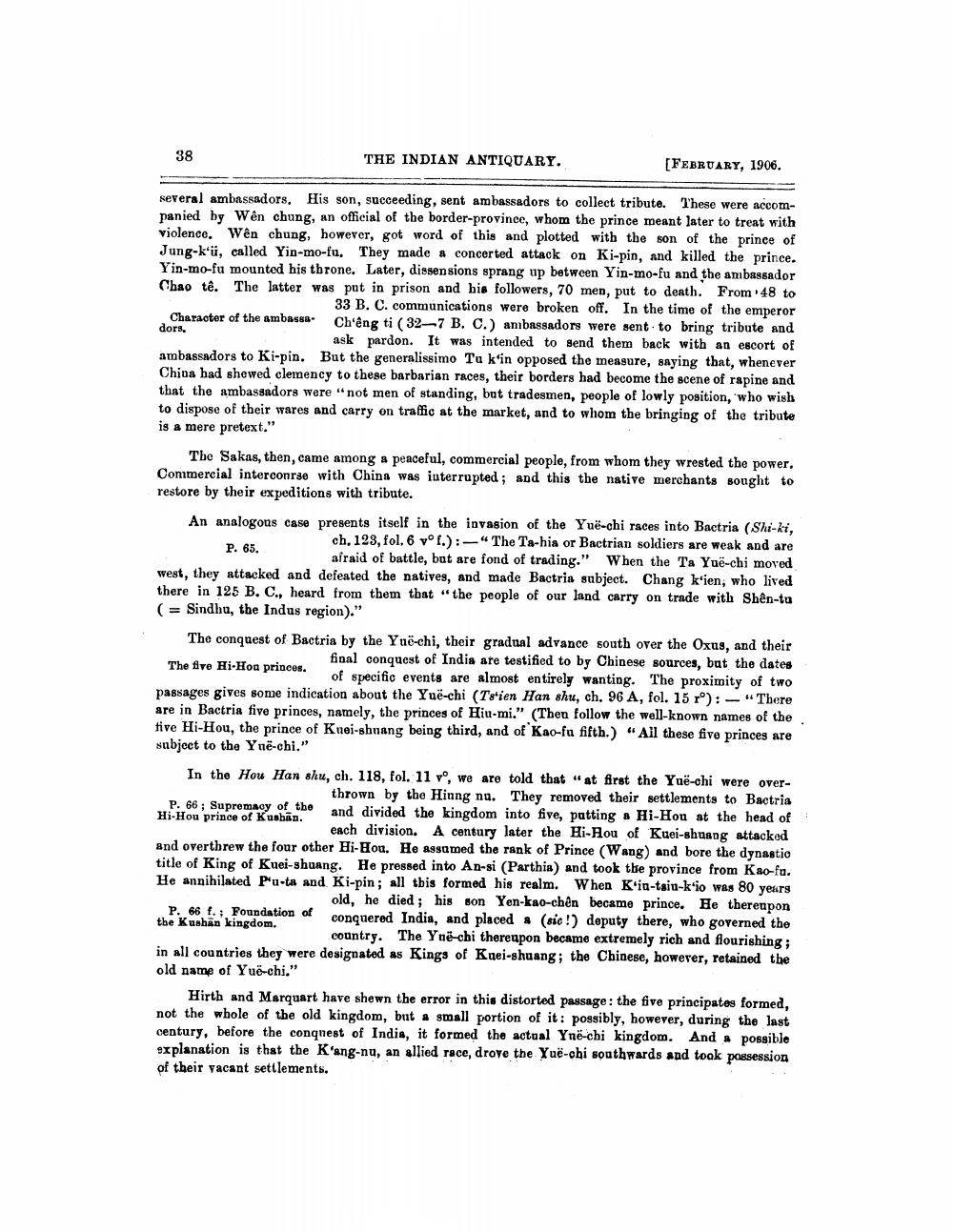________________
38
THE INDIAN ANTIQUARY.
[FEBRUARY, 1906.
several ambassadors. His son, succeeding, sent ambassadors to collect tribute. These were accompanied by Wên chung, an official of the border-province, whom the prince meant later to treat with violence. Wên chung, however, got word of this and plotted with the son of the prince of Jung-k'ü, called Yin-mo-fu. They made a concerted attack on Ki-pin, and killed the prince. Yin-mo-fu mounted his throne. Later, dissensions sprang up between Yin-mo-fu and the ambassador Chao tê. The latter was put in prison and his followers, 70 men, put to death. From 48 to
33 B. C. communications were broken off. In the time of the emperor Character of the ambassa- Ch'êng ti (32—7 B. C.) ambassadors were sent to bring tribute and dors,
ask pardon. It was intended to send them back with an escort of ambassadors to Ki-pin. But the generalissimo Tu k'in opposed the measure, saying that, whenever Chiva had shewed clemency to these barbarian races, their borders had become the scene of rapine and that the ambassadors were not men of standing, but tradesmen, people of lowly position, who wish to dispose of their wares and carry on traffic at the market, and to whom the bringing of the tribute is a mere pretext."
The Sakas, then, came among a peaceful, commercial people, from whom they wrested the power, Commercial interconrse with China was interrupted ; and this the native merchants sought to restore by their expeditions with tribute. An analogous Case presents itself in the invasion of the Yue-chi races into Bactria (Shi-ki,
ch, 123, fol. 6 vol.):-“The Ta-hia or Bactrian soldiers are weak and are P. 65.
afraid of battle, but are fond of trading." When the Ta Yuë-chi moved west, they attacked and defeated the natives, and made Bactria subject. Chang k'ien, who lived there in 125 B. C., heard from them that "the people of our land carry on trade with Shên-ta (= Sindhu, the Indus region)."
The conquest of Bactria by the Yuc-chi, their gradual advance south over the Oxus, and their The fire Hi-Hoa princes.
final conquest of India are testified to by Chinese sources, but the dates
of specific events are almost entirely wanting. The proximity of two passages gives some indication about the Yuc-chi (Tsien Han shu, ch, 96 A, fol. 15 ro): - "There are in Bactria five princes, namely, the princes of Hiu-mi.” (Then follow the well-known names of the tive Hi-Hou, the prince of Knei-shuang being third, and of Kao-fa fifth.) "All these five princes are subject to the Ynë-chi." In the Hou Han shu, ch. 118, fol. 11 °, we are told that "at first the Yuë-chi were over
thrown by the Hinng na. They removed their settlements to Bactria P. 66; Supremacy of the and divided the kingdom into five, putting a Hi-Hou at the head of Hi-Hou prince of Kusban.
each division. A century later the Hi-Hou of Kuei-shuang attacked and overthrew the four other Hi-Hou. He assumed the rank of Prince (Wang) and bore the dynastio title of King of Kuei-shuang. He pressed into An-si (Parthia) and took the province from Kao-fa. He annihilated Pu-ta and Ki-pin; all this formed his realm. When K'ia-tsin-k'io was 80 years
old, he died; his son Yen-kao-chên became prince. He thereupon P. 66 f. ; Foundation of conguered India, and placed « (sic!) deputy there, who governed the the Kushan kingdom.
country. The Ynë-chi thereupon became extremely rich and flourishing ; in all countries they were designated as Kings of Kgei-shuang; the Chinese, however, retained the old name of Yue-chi."
Hirth and Marquart have shewn the error in this distorted passage: the five principates formed, not the whole of the old kingdom, but a small portion of it: possibly, however, during the last century, before the conqnest of India, it formed the actual Ynë-chi kingdom. And a possible explanation is that the K'ang-nu, an allied race, drove the Yuë-chi southwards and took possession of their vacant settlements.




